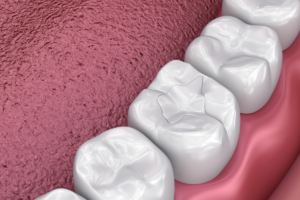Brain fog, a condition characterized by cognitive and awareness dysfunction, can significantly impact one’s quality of life. Dr. Maryam Horiyat from Aria Dental, a Holistic, Biological, Integrative dental office in south Orange County, California, has noticed a remarkable connection between brain fog and oral health. This blog post will delve into brain fog, the brain’s functioning, and how dental health, including previous procedures and materials, can cause this cognitive impairment.
What Is Brain Fog?
Brain fog, often referred to as mental fatigue, is not a distinct medical ailment in itself, but rather, it presents as a symptom associated with other medical conditions. This condition involves a cognitive and awareness dysfunction, giving rise to the following manifestations:
Impaired Memory: You may have difficulty retaining and recalling information, lack mental clarity, and experience mental haziness and uncertainty.
Poor Concentration and Inability to Focus: You may need help maintaining attention and mental attentiveness.
Fatigue and Low Energy: You may experience weariness and reduced vitality. You might also need help organizing thoughts or activities, experiencing challenges in structuring and planning cognitive processes and tasks.
Forgetfulness, Including Forgetting Daily Tasks or Losing a Train of Thought: you may experience memory lapses, leading to forgetting routine activities or interrupted thinking patterns.
It is essential to note that some individuals also liken brain fog to mental fatigue.
To effectively address this cognitive condition, it is crucial to identify and treat the underlying medical issues contributing to brain fog. Seeking professional medical guidance is imperative to manage and alleviate its impact on cognitive function and overall well-being.
How Could We Stop Brain Fog?
To effectively address and eliminate brain fog, it is crucial to comprehend the essential requirements of the brain and ensure its optimal functioning by fulfilling these needs. In other words, considering its various senses and awareness, you must understand how the brain processes information and communicates with the rest of the body.
Our five senses, namely Sight, Sound, Taste, Smell, and Touch, play a significant role in perceiving the world around us. Additionally, the brain is tuned to diverse forms of awareness, including Pressure, Temperature, Humidity, Gravity, Space, Surrounding Mood, and Energy.
The brain employs different modalities to process and integrate all this information:
Electrical Signals: These signals travel along the central nervous system into the peripheral nervous system.
Chemicals or Molecules: Hormones and Neurotransmitters are involved in this processing mode.
Electromagnetic System: The brain utilizes the electric magnetic modality, akin to acupuncture or the meridian system, in other body parts.
Bio-Photons: Our body has receptors for bio-photons, which are light frequencies the brain can process. This phenomenon is analogous to the therapeutic effect of laser light on our bodies.
Ensuring that the brain functions optimally and processes all these modalities effectively requires meeting specific physical needs:
- Stable and Consistent Energy
- Adequate Oxygen Supply
- Essential Fuels and Calories (including carbohydrates, fats, and proteins)
- Vital Nutrients such as Enzymes, Vitamins, Electrolytes, Minerals, and Antioxidants
- Proper Hydration
- Stimulation and Regeneration (enabling the brain to replace old cells with new ones)
Any factors that disrupt these brain needs and interfere with the brain’s modalities can result in brain dysfunction, leading to cognitive and awareness dysfunctions such as brain fog.
Three Primary Factors That Disrupt the Modalities of Brain Function Are as Follows:
- Insufficient energy production and delivery to brain cells
- Inflammation
- Disruption of brain signals
Lack of Energy Formation And Delivery to the Brain Can Be Caused by Several Things, Such as:
- Situations like lack of adequate oxygen, nutrients, hydration, and blood circulation
- Medical conditions like insulin-resistant diabetics, anemia, and brain cell degeneration
- Conditions like stress, especially chronic stress, trauma, depression, and sleeping conditions.
- Toxins like drugs, smoking, alcohol, chemicals, and heavy metals
Inflammation- When There Is Inflammation, Hardly Anything Usually Works.
On a cellular level, brain fog is believed to be caused mainly by high levels of inflammation and changes to hormones and Neurotransmitters in the nervous system that determine mood, energy, and focus.
Several factors can contribute to inflammation and, consequently, brain fog:
A. Infection: among the most potent sources of inflammation are infections caused by bacteria, viruses, fungi, and even parasites.
B. Food allergy and chemical reaction: allergic reactions to certain foods and chemical compounds can trigger inflammation, increasing brain fog risk.
C. Leaky gut and even leaky mouth or gum: it is essential to remember that the mouth is part of the gastrointestinal (GI) system, where digestion and absorption occur. Suppose the gut or mouth experiences permeability issues (leaky gut or leaky mouth/gum). In that case, it can lead to a “leaky brain,” potentially resulting in neuro-inflammation and contributing to the development of brain fog.
Brain Signal Disruption
The brain constantly processes signals, and the more efficiently these signals are processed, the better the brain maintains balance and achieves homeostasis. However, the brain’s proper functioning could be improved if anything interferes with these signals and distorts them.
Brain signal disruption can arise from various sources, including Electromagnetic Fields (EMS), jet lag, sleep cycle disruptions, exposure to toxins, and galvanic shock in the mouth due to dissimilar metals.
Additionally, metals, chemicals, and particles that occupy the receptor sites intended for the body’s natural communication can cause the signals to be either amplified or diminished, leading to disruptions in brain signaling.
Oral Health & Brain Fog

One might wonder how oral health and dental materials could contribute to brain fog.
It is essential to understand that any oral conditions that impact a person physically, mentally, or emotionally can influence the brain’s function and modalities, potentially leading to brain dysfunction, such as brain fog.
Considering the significant connection between oral health and overall well-being, addressing oral issues and ensuring proper dental care becomes crucial in maintaining optimal brain function and reducing the likelihood of brain fog.
Heavy Metals in Dentistry

Mercury, a well-known non-radioactive neurotoxic heavy metal, poses a significant concern in dental amalgam silver fillings, as they contain over 50% mercury. These fillings continuously release mercury into the mouth while chewing and brushing, leading to heavy metal toxicity. This toxicity, in turn, adversely affects various brain functions and modalities, contributing to the development of brain fog.
Dentistry also commonly employs other heavy metals, such as nickel, cobalt, chromium, titanium, and cadmium, used in crowns like porcelain fused to metal crowns (PFM). Despite the tooth-colored appearance of these crowns, they contain diverse metal alloys that not only trigger chemical inflammation but also interfere with brain signaling and the formation and delivery of energy to the brain.
Furthermore, though predominantly made of titanium, titanium dental implants also include other metal alloys. Over time, these implants corrode and release metals into the jawbone, leading to metal toxicity that can disrupt all brain modalities.
On top of this, many implants and abutments are composed of dissimilar metals, causing galvanic shock during activities like chewing, swallowing, and speaking. This galvanic shock can interrupt brain signaling and contribute to brain dysfunction, including brain fog.
To safeguard brain health and minimize the risk of brain fog, individuals need to be aware of the potential impact of heavy metals used in dental procedures. Seeking alternative materials and closely monitoring oral health can significantly reduce exposure to neurotoxic heavy metals and support overall cognitive well-being.
Microbes and Their Neurotoxin
Various bacteria in the mouth can cause oral health issues, such as Periodontitis or gum disease, gingivitis, and tooth abscesses. These conditions can lead to a phenomenon known as “leaky gum,” triggering a pro-inflammatory response that ultimately affects brain function and may contribute to brain fog.
Another overlooked oral health concern in conventional dentistry is the hidden jawbone cavitation, commonly found around root canal teeth or areas of previous tooth extraction, particularly wisdom teeth. These cavitations can become breeding grounds for harmful microorganisms, including bacteria, fungi, and toxins from their metabolic waste products. This toxic environment interferes with brain energy formation and hampers energy delivery to the brain, resulting in extensive hidden inflammation that may lead to brain fog.
One challenge in addressing these issues is that many chronic mouth infections remain silent and painless, often unnoticed by patients. As a result, patients may need to be made aware of such infections and their potential impacts on overall health.
In her practice, Dr. Horiyat has encountered numerous patients with asymptomatic or non-painful chronic infections around their teeth, particularly near root canal-treated teeth. Unfortunately, due to the current design of our dental system, routine dental appointments typically do not include X-rays of root tips or apex, leading to the possibility that these chronic tooth infections might go undetected.
Raising awareness about these silent oral health issues and their potential effects on overall well-being is crucial. Routine dental check-ups should be enhanced to include more comprehensive assessments, such as X-rays of root areas, to identify and address these chronic infections promptly. By addressing oral health problems proactively, we can help mitigate the risk of brain dysfunction, including brain fog, and promote overall cognitive health.
Connection Between Root Canal Teeth and Brain Fog

Each tooth is not just an inanimate structure but a living organ with its intricate circulation network, nerves, and connective tissues, forming a vital link to the lymphatic system.
Furthermore, through the meridian or acupuncture connections, each tooth establishes unique connections with various organs, glands, joints, and sensory systems. (MERIDIAN CHART HERE)
Additionally, each tooth plays a role in our skeletal and bone structure, serving as a pathway for transmitting electromagnetic signals.
However, a root canal procedure on a tooth effectively renders the tooth lifeless, leaving it as a dead organ embedded in the jawbone. This alteration can trigger an immune response leading to chronic inflammation, potentially impacting brain function. This chronic inflammation can interfere with the brain’s hormones and receptors, influencing its performance.
Moreover, disrupting the meridian and acupuncture signaling and the electromagnetic field surrounding the tooth can further impede the smooth delivery of energy and electrical signals to and from the brain. Such disruptions can contribute to brain dysfunction, including the onset of brain fog.
Awareness of these intricate connections between oral health and overall well-being is essential. Considering the implications of dental procedures like root canals on the body’s systems, and their potential impact on brain health, can lead to more informed decision-making regarding dental treatments. By prioritizing holistic oral care, we can work towards preserving dental and cognitive health, fostering a better quality of life.
Toxins Like Fluoride
Fluoride in dental products, particularly toothpaste, can disrupt brain hormones and neurotransmitters.
Additionally, fluoride can harm the pineal gland in the brain, which plays a crucial role in producing melatonin and other hormones responsible for regulating sleep patterns. Consequently, the interference caused by fluoride in the pineal gland may lead to sleep disorders in specific individuals, ultimately contributing to the onset of brain fog.
It is essential to be mindful of the potential impacts of fluoride on brain health and consider alternative dental products that prioritize overall well-being. By opting for fluoride-free alternatives and maintaining a healthy sleep routine, we can proactively mitigate the risk of brain fog and promote optimal cognitive function.
Another Link Between the Mouth and Brain Fog Is Compromised Airways
Various factors can cause brain fog, and one of them is airway obstruction, particularly sleep apnea. During sleep, the body may experience oxygen deprivation, essential for optimal brain function.
Airway obstruction, like sleep apnea, can arise from physical factors such as a narrow palatal arch, high vault or arched hard palate, and crowded teeth. These issues can lead to the tongue being restricted and pushed towards the throat, contributing to sleep apnea. While adults can benefit from obstruction assistance through appliances, children can undergo complete treatment with proper appliances or orthodontic intervention.
In holistic, biological, and physiological dentistry, we recognize the profound impact of oral health on overall well-being, mainly brain function. Our understanding extends to the intricate connections between each tooth and various body parts, including the brain, through acupuncture meridians. Consequently, any oral disease not only affects dental health but can also affect other organs, significantly influencing brain function.
By embracing a comprehensive approach to dental care, we prioritize your overall health, knowing that a healthy mouth is instrumental in promoting optimal brain function and overall wellness. Addressing any potential airway obstruction and oral health issues impacts your cognitive well-being and helps combat brain fog effectively.
Conclusion
Understanding the profound connection between brain fog and dental health is essential for overall well-being. Dental materials, procedures, and oral health conditions can significantly impact brain function modalities, leading to cognitive impairments like fog.
Dr. Maryam Horiyat’s holistic, biological, and physiological approach to dentistry highlights the importance of addressing oral health to improve overall health, including brain function.
If you suffer from brain fog, considering the influence of your dental health might be a crucial step toward finding relief and restoring mental clarity and focus in your daily life.



















